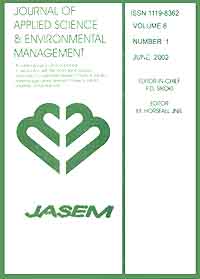
|
Journal of Applied Sciences and Environmental Management
World Bank assisted National Agricultural Research Project (NARP) - University of Port Harcourt
ISSN: 1119-8362
Vol. 22, No. 5, 2018, pp. 797-802
|
 Bioline Code: ja18141
Bioline Code: ja18141
Full paper language: English
Document type: Research Article
Document available free of charge
|
|
|
Journal of Applied Sciences and Environmental Management, Vol. 22, No. 5, 2018, pp. 797-802
| en |
Fatty Acid Methyl Ester of Nigerian Spent Palm and Peanut Oils: Non-Food Option for Biodiesel to Safe Food Security and Environment (Part I)
MOYIB, OK & OMOTOLA, OE
Abstract
In the awakening of Nigeria biofuel economy and reduced carbon footprint revolution, her targeted
feedstocks such as sweet sorghum and palm oil are hidden threat to food security. To avoid this scenario, the present
study derived fatty acid methyl esters (FAME) from Nigerian spent palm and peanut oils (NSPO and NSPeO) as cheap
and non-food feedstocks for biodiesel and safe environment. Fresh and spent Nigerian palm oil (NPO) and peanut oil
(NPeO) were converted into FAME by one and two steps alkali transesterification using 6:1 molar ratio of methanol to
oil, 1.0 % wt. potassium hydroxide pellets as catalyst at 60oC over 1 hr. Characterization of feedstocks and FAME
were carried out using European (EN) and USA (ASTM) norms for quality biodiesel. The quality of final FAME
obtained after two-steps alkali transesterification were within international norms for biodiesel except for alkali and
alkaline earth metals that required further removal using adsorption process as a post-transesterification treatment. The
present study reveals Nigerian spent palm and peanut oils as potential non-food feedstocks for biodiesel production to
safe food security and environment.
Keywords
Alkali-transesterification; fatty acid methyl ester; food security; Nigerian spent palm
|
| |
© Copyright 2018 - Moyib and Omotola
|
|
